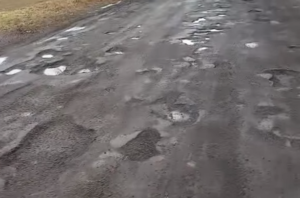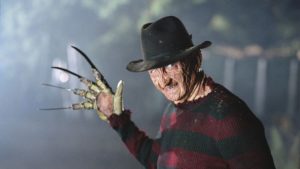
Access denied
It would be fair to say that I was a particularly sensitive child, but even the sturdiest of eight-year-olds would have struggled with that 18-rated flick, with the sight of Freddy’s disfigured face, his bladed glove, his hat, with the blood, the gore, and that voice, oh Jesus that voice. From the off I knew I was in way over my head, but, eager to appear tough in front of the lads, I saw it through to the bitter end. And so, for months afterwards I lay in bed, wide awake, fearfully awaiting Freddy’s arrival, wondering just when and where the attack would come from. He was my bogeyman, my arch-nemesis, the one who haunted me more than any other.
How my cousins, who were no older than thirteen themselves, procured a film only intended for adults is hardly a mystery. They most likely waited until mam and dad were out, reached into the back of the cupboard and hey presto, a video nasty for all the family. This was how we were all introduced to characters like Freddy Kreuger, to Pinhead, Leatherface and Jason, how we came of age, whether we liked it or not. And a few years later the content changed, we were still watching rabid freaks chasing down winsome teens, but now they were all naked and it made us feel funny, so funny that we had to politely excuse ourselves and make for the bathroom post-haste.
If our parents had found out what we’d been watching they would have been horrified. They would have sent us to bed early, grounded us, and then found better hiding places for their porno stash. But in reality they wouldn’t have been all that surprised. Because they were the same when they were our age, they sought out explicit viewing material; but in their case it was Porky’s or Psycho rather than Hellraiser and Naughty Nympho Nurses Vol IV. Fast forward a generation and the landscape has changed somewhat. Today’s children can watch things that even their parents would balk at. They can watch real-life torture videos, beheadings, bona fide suicides, and they can watch sex acts so graphic, so depraved, that the resulting nightmares may never end.

The case involving Matthew Horan, wherein he coerced girls as young as nine to perform sex acts live on camera, offers only the briefest of glimpses into a world many of us would struggle to comprehend, a world where children, little kids, are aggressively targeted, groomed, and blackmailed into sating the desires of nameless, faceless paedophiles. This is the same world which spawned Kieran Creaven, the RTÉ producer who travelled to Leeds to meet, what turned out to be, a fictitious thirteen-year-old girl for sex, a world where supposedly child-friendly apps are inhabited by ruthless deviants, people whose sole objective, whose sole reason for being on these sites, is to befriend naïve youngsters and see how far they can take it.
As the first generation to truly grow up with the Internet, the children of today are the guinea pigs in an exceptionally risky experiment. They have been encouraged to utilise this amazing resource, to embrace the best things it has to offer, to learn from it and develop skills and faculties which will benefit them for the rest of their lives. We understood the risks, were cognisant of the dangers, but how could we stop them? Their friends all had smartphones, gamed online, it’d be cruel to make them miss out. And besides, that tablet was the only thing which kept them quiet. So, we’ve relented, bowed to the pressure, and then blamed ourselves when something goes wrong.

Others have suggested that the websites themselves finally accept culpability, that they protect visitors to their sites or face prosecution. Yet more commentators, and the more militant among them, believe that only by forcing all Internet users to submit their social security numbers, thus revealing their age, gender and profile to everyone they interact with, can we ever hope to create a child-friendly online environment. But the sad fact is that none of these measures will completely eradicate the threat, none of them will allow the parents of vulnerable children to rest easy at night. In a situation like this there is no half-measure, no way of stemming the tide, of regulating the online sphere so that our children can exist in perfect harmony.
Ultimately, if we are ever to protect our children, we need to ban them from the Internet. We tried it one way and it failed, spectacularly, now it’s time to do what we should have done from the outset. No children under the age of sixteen should own a smartphone or a tablet. If they need to use the Internet to do schoolwork they do it at school or at home under the supervision of an adult. If your child needs a phone, they get one of the retro Nokias which have recently come back into fashion. This may sound extreme, but what other option is there? There can be no plausible reason for allowing a child to be online, none whatsoever.
Sure, they’ll whine and complain, they’ll bitch and moan, and you can guarantee that some will access the web when they’re not supposed to. But when they do it’ll only be to watch a naughty video, to ogle pneumatic blondes, because, with no-one left to target, the predators will have long since averted their gaze.
Another bump in the road

Potholes. We’ve got lots of them, and not just in the countryside. According to Fianna Fáil councillor, Kevin Sheahan, it should be the job of our prisoners to repair our roads. A novel idea, and one which worked to great effect about eighty years ago. Time has moved on since then, nowadays we have these things called governments, institutions which are supposed to act on behalf of the people. The idea is that we elect them to positions of authority and they then strive to improve the lives of the average citizen. But instead what they do is pass the buck, usually to one another, but in this case to the incarcerated. I’m not sure where they go from here.



